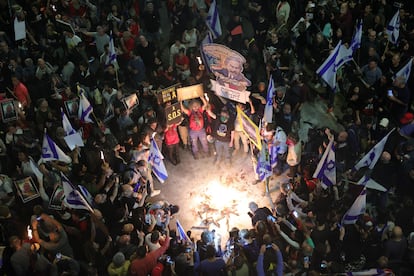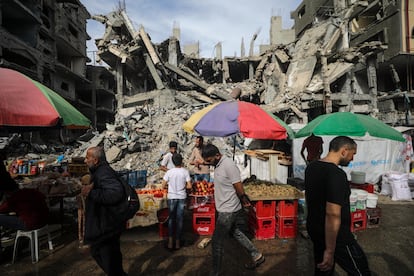Six months since the start of the war in Gaza, Israel is feeling increasingly threatened and isolated
Netanyahu’s objectives continue to fail, the risk of conflict with Iran is growing, there are 130,000 evacuees with no prospects of returning, and the country’s prestige is in tatters. Tens of thousands of protesters are now calling for the prime minister to resign

“A round of applause for all of us here. There are more than 100,000 of us. It is the largest demonstration since the war began!” protesters declared this Saturday from the stage erected symbolically at the intersection in Tel Aviv that city officials renamed Democracy Square. The newly named intersection took its name from the protests against the judicial reforms of Prime Minister Benjamin Netanyahu that converged there.
It is the same mass of national flags that protested against the Netanyahu government last year, but now they have a different slogan (“Elections now”) and a different context, which Shai Meidar, from the anti-government organization The Day After — and who has been called up like 300,000 other reservists — summarized from the podium: “Every day I live the contradiction of serving my country as a reservist under a government that I do not trust and that is conducting this war with absolutely no responsibility.” Or as Lior Akerman, a researcher and former high command of the intelligence services, described it: “We are forced to fight against an external enemy and against another whose role on October 7 was supposed to be to defend us.”
They were not protesting against the war. In fact, 88% of Israeli Jews support it, and more than half oppose the entry of humanitarian aid into Gaza while there are still hostages being kept there and advocate that the army use even more force in its offensive. They had gathered to demonstrate against Netanyahu’s management of the conflict. They were protesting the man who has been in power the longest in the history of the State of Israel and whom Israelis either love or hate, with no middle ground.
More and more Israelis believe that he is artificially prolonging the war for political survival and have taken to the streets, with a mixture of old slogans (“Bibi [Netanyahu], go home!”) and new ones, such as “Deal now!” and “Everyone now!” They want the government to pay the price Hamas is asking for the 133 hostages left in Gaza. Above all, they are the same people, albeit less numerous this time, who took to the same streets in Tel Aviv in protest against the judicial reform for nine months in 2023.
Their faces reflected the rarefied atmosphere in which Israel marked six months of war this Sunday. The collective emotion has been mutating. First, it was the surprise and sadness at the deadliest day in the country’s history. The stories of cold-blooded murders and of civilians waiting for hours for soldiers to arrive awakened all the ghosts of helplessness of the Holocaust. Euphoria over the destruction in Gaza followed, as a kind of redemptive revenge, with a rhetoric that criminalized civilians. Now, there is a feeling that there is a lack of direction and that Netanyahu has no plan other than to prolong the invasion as much as possible for the sake of his own political survival. The motto “Together we will win” still adorns buildings and illuminated signs everywhere, but it already sounds like an empty slogan.

First, the facts. Israel has killed more than 33,000 Palestinians, according to the Hamas-run Gaza Ministry of Health. The Israeli army has left half of Gaza in ruins and hundreds of thousands of people on the brink of famine, by using food as a weapon of war. The country has shredded its own international image and lacks a realistic plan to end the war and for what comes next. International pressure stopped the invasion of Rafah, which was announced more than a month ago, and around 130,000 Israeli citizens (more than 1% of the population) who were evacuated from the borders with Lebanon and Gaza have not been given a timeline to return.
However, the Israeli army — the most powerful in the Middle East — has not completed a single one of its objectives, which were to rescue all the hostages (133 remain in Gaza, and it is believed that at least a quarter of them are already dead), to completely destroy Hamas politically and militarily, and to ensure that Gaza “never again poses a threat.” Netanyahu insists that “total victory” is “within reach,” after dismantling 18 of the 24 Hamas battalions, and that this inexorably involves invading Rafah, a precarious refuge for the majority of Gazans (over one million people) and where his own allies have drawn a red line.
“Today it is clear to everyone — except those who follow him blindly — that the promises of ‘total victory’ that Netanyahu makes day in and day out, are totally empty,” Amos Harel, a military affairs commentator from the newspaper Haaretz wrote Friday. “The expectation of dismantling the Hamas regime and annihilating all its military capabilities was too high, certainly within a rigid time frame of a few months. The war was destined to be prolonged, and it is hard to believe that it will be possible to completely dismantle the regime even in the future.”

Furthermore, Israel has never been closer to a war with the Hezbollah militia in Lebanon or even with Iran, after assassinating one of its main military commanders last Monday. Eran Etzion, deputy director general of Israel’s National Security Council, described this decision as one of “the most scandalous” in the country’s history, since “the probability of a response is quite high.” “Israel is at the greatest strategic disadvantage in its history, but the government responsible for it brings us to the brink of a war with an enemy more powerful and sophisticated than any we have ever known,” at a time when its international image “is at a historic low,” its main ally (the United States) does not trust Netanyahu, the Arab countries are tired of unsuccessfully seeking a ceasefire in Gaza, and Europe sees the war as “damaging to its strategic agenda.”
“While embarking on a war supposedly meant to restore security, six months in, Israel is arguably much less safe, facing far more threats, scenarios and fronts than at any other time” in its 75-year history, Mairav Zonszein, a senior analyst on Israel at the International Crisis Group think tank, lamented on X (formerly Twitter) on Saturday. Last week, Israelis stocked up on food, electricity generators, and bottled water for fear of an imminent post-Ramadan reprisal.
The debate around Netanyahu
The debate — often more personal than political and more emotional than ideological — revolves around Netanyahu. In a way, it is as if Israel had returned to October 6. The government is in danger due to the exemption from compulsory military service for the ultra-Orthodox community, which is an issue that greatly affects the more secular Israel of European origin that was already protesting against Netanyahu’s judicial reform.
Last week, protesters demanding his resignation, an early election, and an agreement for the return of the hostages demonstrated together. Disparate struggles sometimes intersect. At the end of the protest in Democracy Square, they called on the hostages’ families protesting in the same city to join them. The breach in trust between the government and the families has been widening due to the conviction that Netanyahu is stopping a second hostage exchange with Hamas for his own shady convenience. Accused of corruption and indicted on criminal charges, he would easily lose the elections, according to all the polls released since October 7. The Hamas attack left his “Mr. Security” credentials in tatters. The shelved judicial reform has already worn out its popularity.
Last Wednesday, activists and relatives of hostages smeared yellow paint — the color that symbolizes their movement — on the glass partition between the public gallery and the plenum in the Knesset, the Israeli parliament. Security immediately intervened to restore order. “In no other country in the world would this government have been in power on October 8,” reacted the former prime minister and leader of the opposition, Yair Lapid.
Netanyahu’s words about his constant personal involvement in reaching an agreement to bring the captured Israelis home can no longer hide the dimension of the rift between the government and the hostages’ families, which came to light on Saturday with particular starkness. The army announced that it had recovered the lifeless body of Elad Katzir, one of the hostages, in a nighttime operation in Khan Younis. It added that intelligence information indicates that he was murdered in January by his captors from the Palestinian Islamic Jihad paramilitary organization.
His sister, Carmit Palty Katzir, responded with a painful message on Facebook in which she accused the government of Elad’s death. “He could have been saved in time with an agreement […] Look in the mirror and see if your hands have not shed that blood,” she wrote. Palty Katzir echoed the uncertainty that the relatives are suffering after half a year of waiting and weekly demonstrations: “What the military spokesperson will not tell you is that the prime minister, the government, and the army have no idea where the most of the hostages are, nor do they have any way to protect them, even if they knew.”
Netanyahu insisted last week that “Hamas hardens its position” in the dialogue when “Israel shows flexibility,” so increasing concessions “does not bring an agreement closer, but rather moves it farther away.” Nissim Vaturi, one of the lawmakers from Netanyahu’s Likud party, is not so diplomatic and has gone so far as to accuse “a minority of the hostages’ families” of preferring to “overthrow the government” rather than see their loved ones again. The Minister of Heritage, the far-right Amihai Ben-Eliyahu, described a recent protest in Tel Aviv as a “gift to Hamas” that “weakens the soldiers on the front.”
The first ceasefire, in November 2023, was cheap and easy: one hostage was released for every three Palestinian prisoners held by Israel. A decade earlier, Netanyahu himself had released a thousand for a single soldier. Among them was Yahya Sinwar, the leader of Hamas in Gaza. The political and military leaders have not called him a “dead man” for weeks because they suspect that he is hiding out in the many tunnels in the Gaza Strip. Sinwar remains at large despite the surveillance drones, the thousands of interrogations, and the troops on every corner, except in Rafah. Netanyahu has turned the invasion of Rafah into a kind of catchphrase for the electorate and a maneuver to distract the public.

The role of the U.S.
Israel is not isolated: not even the Arab countries have cut off relations, and the United States has not stopped sending weapons and has vetoed three ceasefire resolutions in the United Nations. But more and more Democratic voices are calling for the U.S. to turn off the tap. The country’s recent abstention from the latest U.N. Security Council ceasefire resolution vote marked the first wake-up call, and the killing of the seven aid workers last week cemented the change in tone and pressure. Last Thursday, President Biden extracted his first major concession from Netanyahu in half a year: the opening of a crossing into Gaza at Erez and the use of the Ashdod port for humanitarian aid to enter the besieged Palestinian enclave.
One of the reasons why Israelis believe that Netanyahu is buying time is the proximity of the elections in the United States. The presidential election in November sees Donald Trump as the favorite. It is a high-stakes gamble, because the men had a poor relationship when they were both in power at the same time. In fact, before the corpses of October 7 had gone cold, Trump came out and said that he “will never forget” that Netanyahu “let us down” in 2020 by refusing to participate in the assassination of a powerful Iranian general, Qasem Soleimani, in Baghdad without explaining why.
Also because it is difficult to understand what Trump wants. He advocates for a ceasefire, because he is “not sure” that he “is loving” how Israel is conducting the military offensive and because Israel is “losing the PR war.” But he also encourages the country to “get it over with” and “get back to normalcy.” He has also reached the absurd point of blaming President Joe Biden for the attack on October 7, claiming that Hamas doesn’t respect the president. “He can’t put two sentences together. He can’t talk. He’s a very dumb person. [...] [Hamas] saw him as a weak, ineffective president, [Hamas] would have never done that attack if I were [president].”
Trump is unpredictable, but during his term as president he recognized Jerusalem as the capital of Israel — reversing decades of American foreign policy and international consensus — and entrusted his son-in-law Jared Kushner with the “deal of the century” Middle East peace plan, which heavily favored the Jewish State. By the way, Kushner said in an interview last February that properties on Gaza’s shattered coast “could be very valuable” and suggested that the army take civilians in Rafah to the Israeli Negev desert.
Cracks in the government
Last Sunday, the media mistakenly received images of Netanyahu rehearsing before the press conference. Perhaps because of the hernia operation he had just undergone, and from which he has already been discharged, the camera sees a despotic leader (“Are you crazy?” he asks his team irritably), he is tetchy and unsure of how to start the speech (”Citizens from Israel, good evening... Why ‘good evening’? Well, never mind”). Three days later, the key to the war government’s stability, Benny Gantz, called for early elections in September. He has not appeared at press conferences with Netanyahu and Defense Minister Yoav Gallant for weeks. His body language towards the prime minister denotes distrust, whereas with Gallant, it shows respect between two former high military commanders, despite their ideological differences.
Gantz justified the move as necessary to prevent “cracks from appearing in the nation.” In reality, it has more to do with the fact that the polls show him as the eventual winner. He is also under pressure from members of his own National Unity party. His departure would not leave Netanyahu in a minority (he could continue governing with the ultranationalist and ultra-Orthodox partners he has had since the 2022 elections, the most right-wing coalition in the country’s history), but it would start the countdown to new elections.
Gantz set the date for the elections “at the lowest point in the short life of the government of which he is a part.” So says one of the most influential political commentators, Nahum Barnea, in the newspaper Yediot Aharonot as he took stock of the current situation: “The army is faltering in Gaza, the mistaken attack on seven human rights activists has caused possibly irreversible damage to the expansion of fighting to Rafah, the assassination of the Iranian general may lead Israel into a regional war, and the relationship with the Biden administration and Israel’s standing in American public opinion are collapsing.”
Six months of war in Gaza
October 7, 2023. Hamas launches a massive surprise attack in which it kills about 1,200 people and takes more than 240 hostages. It is the deadliest day in Israel's history. Netanyahu announces a "long and difficult" war.
October 8, 2023. The Hezbollah militia launches projectiles at Israel, which in turn bombards Lebanon. The clashes have continued daily and have increased in intensity.
October 9, 2023. The Israeli Minister of Defense announces the "total blockade" of Gaza: "No water, no food, no electricity."
October 13, 2023. Israel orders more than a million Gazans to move to southern Gaza.
October 19, 2023. Yemen's Houthis launch missiles and drones at a U.S. warship.
October 21, 2023. An agreement forged by the United States allows the (very limited) entry of humanitarian aid from Egypt.
October 28, 2023. Israel begins the land invasion.
November 15, 2023. Troops enter Al Shifa, Gaza's main hospital, for the first time.
November 21 to December 1, 2023. Ceasefire in which Israel and Hamas exchange hostages for Palestinian prisoners.
February 29, 2024. More than 100 Gazan civilians die while chasing a convoy with humanitarian aid. Part of it is due to Israeli army gunfire.
March 18, 2024. The main food security analysis network warns that famine in northern Gaza is “imminent.”
April 1, 2024. Israel ends its second invasion of the Al Shifa hospital, which is left seriously damaged and with bodies on the ground. It claims to have killed about "200 terrorists" in two weeks and arrested another 500.
April 1, 2024. Israel raises the risk of regional war by assassinating a senior Iranian military commander at the ambassador's residence in Damascus.
April 2, 2024. Unanimous condemnation of the Israeli army for killing seven of NGO World Central Kitchen workers in a triple aerial bombardment. In the investigation, Israeli officials admit "serious errors" and suspend two commanders.
April 5, 2024. Pressured by the White House, Netanyahu opens a means of entry into Gaza for aid and allows the use of a port.
Sign up for our weekly newsletter to get more English-language news coverage from EL PAÍS USA Edition
Tu suscripción se está usando en otro dispositivo
¿Quieres añadir otro usuario a tu suscripción?
Si continúas leyendo en este dispositivo, no se podrá leer en el otro.
FlechaTu suscripción se está usando en otro dispositivo y solo puedes acceder a EL PAÍS desde un dispositivo a la vez.
Si quieres compartir tu cuenta, cambia tu suscripción a la modalidad Premium, así podrás añadir otro usuario. Cada uno accederá con su propia cuenta de email, lo que os permitirá personalizar vuestra experiencia en EL PAÍS.
¿Tienes una suscripción de empresa? Accede aquí para contratar más cuentas.
En el caso de no saber quién está usando tu cuenta, te recomendamos cambiar tu contraseña aquí.
Si decides continuar compartiendo tu cuenta, este mensaje se mostrará en tu dispositivo y en el de la otra persona que está usando tu cuenta de forma indefinida, afectando a tu experiencia de lectura. Puedes consultar aquí los términos y condiciones de la suscripción digital.









































